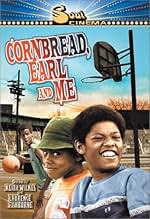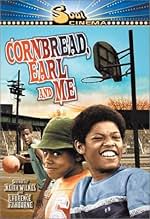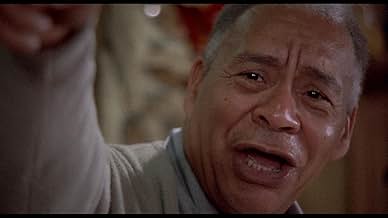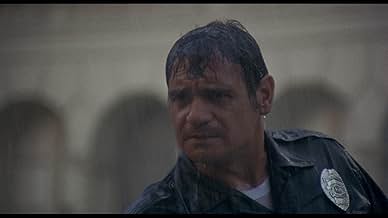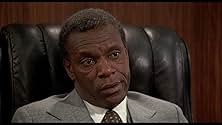AVALIAÇÃO DA IMDb
6,9/10
1,1 mil
SUA AVALIAÇÃO
Adicionar um enredo no seu idiomaA 12-year-old is traumatised by the murder of his friend, a star basketball player.A 12-year-old is traumatised by the murder of his friend, a star basketball player.A 12-year-old is traumatised by the murder of his friend, a star basketball player.
- Direção
- Roteiristas
- Artistas
Jamaal Wilkes
- Nathaniel 'Cornbread' Hamilton
- (as Keith Wilkes)
Laurence Fishburne
- Wilford Robinson
- (as Laurence Fishburne III)
- Direção
- Roteiristas
- Elenco e equipe completos
- Produção, bilheteria e muito mais no IMDbPro
Avaliações em destaque
CE&M is a movie whose story is better than its performances. Cornbread is played by Keith Wilkes who later became Jamaal Wilkes the hall of fame basketball player. As to be expected, he wasn't very strong as an actor. He plays a basketball player, which is not acting.
Earl is played by Tierre Turner, a kid who looked no older than twelve. His part was small even though his name is in the title.
The "Me" in the title is Wilford Robinson (Laurence Fishburne). Sure, he's a great actor now, but he was just passable then.
I don't want to be remiss and forget to mention the veteran actors Bernie Casey, Moses Gunn, and Rosalind Cash. They were all good and lended some much needed credence to the movie.
As for the storyline, Cornbread is a young high school graduate who is going to college in the fall on a full scholarship for basketball. He is a good kid who eats, sleeps, and drinks basketball. He literally has no time for anything else he's so consumed with it. When he gets killed by the police in a case of mistaken identity it sparks outrage from the people and an equal and opposite stonewall stance from the police and the city.
It is a tragic story that squeezes the heart and puts fire in the belly. I like movies that can do that.
The movies I watch that can elicit strong reactions are either bad movies that are so bad I'm just upset, or good movies that put the viewer in the exact state they want them to be in. CE&M does just that in spite of the so-so acting.
Earl is played by Tierre Turner, a kid who looked no older than twelve. His part was small even though his name is in the title.
The "Me" in the title is Wilford Robinson (Laurence Fishburne). Sure, he's a great actor now, but he was just passable then.
I don't want to be remiss and forget to mention the veteran actors Bernie Casey, Moses Gunn, and Rosalind Cash. They were all good and lended some much needed credence to the movie.
As for the storyline, Cornbread is a young high school graduate who is going to college in the fall on a full scholarship for basketball. He is a good kid who eats, sleeps, and drinks basketball. He literally has no time for anything else he's so consumed with it. When he gets killed by the police in a case of mistaken identity it sparks outrage from the people and an equal and opposite stonewall stance from the police and the city.
It is a tragic story that squeezes the heart and puts fire in the belly. I like movies that can do that.
The movies I watch that can elicit strong reactions are either bad movies that are so bad I'm just upset, or good movies that put the viewer in the exact state they want them to be in. CE&M does just that in spite of the so-so acting.
The film does have a moderately intriguing mesage about polkice brutality and political corruption being obscenely hoisted upon African American communities in the urban United States. That said, the film is horribly dated, and elements of it are unnacceptable by today's standards. I mean the slain icon's name is Cornbread for Pete's sake!!! Where wre his cohorts Fried Chicken and Watermelon? Moreover, the societal corruption is presented in a way that makes us feel sad and powerless rather than angry and indignant. This is really a product of the early seventies Blaxploitation genre that would be utterly offensive by today's standards were it not for the still relevant and timely subject matter of the film. Worthwhile viewing for those who can differentiate between the message and the overdone elements. I fear, however, that the film's excess could leave white biggots laughing at the maudlin African American stereotypes on parade rather than addressing the political concerns of the film at all.
I'm not going to summarize the story of this movie; you can find that above.
Rather, I'll just leave my comments on the experience of watching it.
The ;movie is well acted throughout. And that can, at times, make it difficult to watch. When one of the characters is killed, it is difficult to watch his mother's at first unbelieving reaction to the tragedy. You feel something of her grief just in watching the contorsions of her face and body. It's not easy to watch.
Later, watching the police dept intimidate witnesses to avoid a wrongful homicide verdict is also difficult to watch, but in a different sense. You see how powerless the people in this poor neighborhood are to fight back against such administrative corruption. (I also suppose it doesn't make a lot of sense. I would imagine, though I don't know this as a fact, that even in 1975 police depts would have been insured against such expenses.)
It's refreshing that it is a Black lawyer who wins this suit, and not some Great White Savior.
But at the end, you have no assurance that the same thing won't happen again. And again. And again. The shooting of the young Black man was not directly an act of racism - one of the policemen who shot at him was Black himself, and they had been told the rapist they were pursuing was Black. His death is, rather, the result of sloppy procedure and very bad coincidence.
But the intimidation of the potential witnesses by police dept reps suggests that the people in this neighborhood and other poor ones like it have little access to real justice.
Rather, I'll just leave my comments on the experience of watching it.
The ;movie is well acted throughout. And that can, at times, make it difficult to watch. When one of the characters is killed, it is difficult to watch his mother's at first unbelieving reaction to the tragedy. You feel something of her grief just in watching the contorsions of her face and body. It's not easy to watch.
Later, watching the police dept intimidate witnesses to avoid a wrongful homicide verdict is also difficult to watch, but in a different sense. You see how powerless the people in this poor neighborhood are to fight back against such administrative corruption. (I also suppose it doesn't make a lot of sense. I would imagine, though I don't know this as a fact, that even in 1975 police depts would have been insured against such expenses.)
It's refreshing that it is a Black lawyer who wins this suit, and not some Great White Savior.
But at the end, you have no assurance that the same thing won't happen again. And again. And again. The shooting of the young Black man was not directly an act of racism - one of the policemen who shot at him was Black himself, and they had been told the rapist they were pursuing was Black. His death is, rather, the result of sloppy procedure and very bad coincidence.
But the intimidation of the potential witnesses by police dept reps suggests that the people in this neighborhood and other poor ones like it have little access to real justice.
Intermittently powerful, all-too-familiar social-problem realism and maudlin melodrama, "Cornbread, Earl and Me" is, either way, a melancholic affair. The overwrought histrionics, overly-optimistic resolution, and some poor acting are especially unfortunate given how moving the best scenes are here. The rainy killing by policemen and subsequent attack on those murderous officers by the neighborhood is a strong scene--ever more shockingly so as it comes after a dull first act. Moreover, it's well foreshadowed by prior unlawful actions by the cops in harassing and unwarranted searching of suspected criminals. The subsequent intimidation of witnesses leading up to the courtroom conclusion is in way familiarly spot on, too, as the police department and city officials close ranks to obstruct justice and protect their own, but it also often veers over-the-top, as does much of the rest of the picture.
Rather surprisingly given that they cast would-be NBA Hall-of-Famer Jamaal Wilkes that the basketball scenes, or single brief montage rather, are scant and unimpressive. It seems evident he wasn't cast for his acting abilities, after all, and is in good company there with other sports legends. (Not everyone is as fortunate as Wilkes's Lakers teammate Kareem Abdul-Jabbar, to be memorably cast in "Airplane!" (1980), and some face the far more reprehensible fate of appearing in a "Space Jam" burger (1996 and 2021).) The gee-wiz simplistic saintliness of Wilkes's "Cornbread" is of eye-rolling annoyance. And, those poor neighbors putting up with his dribbling a basketball in his flat on his way to an athletic scholarship. Either that apartment building was constructed with some of the best in sound-proofing floor and walls or those neighbors are unsung heroes.
Laurence Fishburne also made his debut here, and evidently he could act even as a child, or at least it seems that way by comparison to the actress, Rosalind Cash, playing his mother, who is the most prominent offender here of some very poor, soap-opera levels of acting (and, indeed, Cash's career ended with a role on daytime soap "General Hospital"). They should've cut the candy bar theft scene that results in her ridiculously weeping over her kid stealing 15 cents worth of merchandise. I get the point of the scene--everyone gets the obvious intent of it--to establish Wilford's, the "Me" protagonist of the title, maturing sense of ethics, but there are better ways to accomplish as much without constantly hitting the audience over the head with the cinematic equivalent of a sledge hammer. Perhaps, this is a product of its era, as much of the representation of African Americans on screen was in blaxploitation flicks, so subtlety doesn't seem to have been valued much, but this material was and is still is socially-relevant and powerful enough to do without the dramatic cop-outs.
Rather surprisingly given that they cast would-be NBA Hall-of-Famer Jamaal Wilkes that the basketball scenes, or single brief montage rather, are scant and unimpressive. It seems evident he wasn't cast for his acting abilities, after all, and is in good company there with other sports legends. (Not everyone is as fortunate as Wilkes's Lakers teammate Kareem Abdul-Jabbar, to be memorably cast in "Airplane!" (1980), and some face the far more reprehensible fate of appearing in a "Space Jam" burger (1996 and 2021).) The gee-wiz simplistic saintliness of Wilkes's "Cornbread" is of eye-rolling annoyance. And, those poor neighbors putting up with his dribbling a basketball in his flat on his way to an athletic scholarship. Either that apartment building was constructed with some of the best in sound-proofing floor and walls or those neighbors are unsung heroes.
Laurence Fishburne also made his debut here, and evidently he could act even as a child, or at least it seems that way by comparison to the actress, Rosalind Cash, playing his mother, who is the most prominent offender here of some very poor, soap-opera levels of acting (and, indeed, Cash's career ended with a role on daytime soap "General Hospital"). They should've cut the candy bar theft scene that results in her ridiculously weeping over her kid stealing 15 cents worth of merchandise. I get the point of the scene--everyone gets the obvious intent of it--to establish Wilford's, the "Me" protagonist of the title, maturing sense of ethics, but there are better ways to accomplish as much without constantly hitting the audience over the head with the cinematic equivalent of a sledge hammer. Perhaps, this is a product of its era, as much of the representation of African Americans on screen was in blaxploitation flicks, so subtlety doesn't seem to have been valued much, but this material was and is still is socially-relevant and powerful enough to do without the dramatic cop-outs.
A kid witnesses the shooting death of the neighborhood basketball star. The basketball player had been mistaken by the police as a crime suspect. The kid is subjected to harrassment from the policement involved to keep quiet about what he knows. The cops even go so far as to intimidate his mother. This is an early film appearance of Lawrence Fishburne's. He was thirteen or fourteen when he did this movie. The always magnificent late Rosalind Cash plays his mother. The film makes a sharp comment about the conflicts people have with the very people who are supposed to be protecting them.
Você sabia?
- CuriosidadesLaurence Fishburne's film debut. He is credited as Laurence Fishburne III.
- Erros de gravaçãoWhen a clay pot is thrown at Officer Atkins and hits the windshield of his cruiser, it breaks. Pieces of glass hit Atkins and embed in his face. But windshields are made of safety glass and though windshields break, they keep the glass in place. So, the glass in this windshield would NOT have flown at Atkins, let alone embed in his face. He would have come out of this situation shaken but physically unharmed.
- Citações
Wilford Robinson: ...they killed Cornbread and he wasn't doin' nothin'
[pause]
Wilford Robinson: all he was doin wuz jus goin' home...
- ConexõesFeatured in Dusk to Dawn Drive-In Trash-o-Rama Show Vol. 2 (1996)
Principais escolhas
Faça login para avaliar e ver a lista de recomendações personalizadas
- How long is Cornbread, Earl and Me?Fornecido pela Alexa
Detalhes
- Data de lançamento
- País de origem
- Central de atendimento oficial
- Idioma
- Também conhecido como
- Hit the Open Man
- Locações de filme
- Empresas de produção
- Consulte mais créditos da empresa na IMDbPro
Bilheteria
- Orçamento
- US$ 800.000 (estimativa)
Contribua para esta página
Sugerir uma alteração ou adicionar conteúdo ausente

Principal brecha
By what name was Cornbread, Earl and Me (1975) officially released in India in English?
Responda

